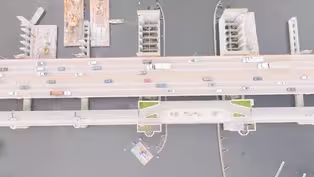
Priced Out
Clip: Season 6 Episode 24 | 9m 7sVideo has Closed Captions
Rhode Island was rated the least affordable state to buy a home in April.
In April, Realtor.com rated Rhode Island the least affordable state to buy a home. Isabella Jibilian of Rhode Island PBS Weekly takes a deep dive into the unique reasons why buyers in the Ocean State are struggling.
Problems playing video? | Closed Captioning Feedback
Problems playing video? | Closed Captioning Feedback
Rhode Island PBS Weekly is a local public television program presented by Ocean State Media

Priced Out
Clip: Season 6 Episode 24 | 9m 7sVideo has Closed Captions
In April, Realtor.com rated Rhode Island the least affordable state to buy a home. Isabella Jibilian of Rhode Island PBS Weekly takes a deep dive into the unique reasons why buyers in the Ocean State are struggling.
Problems playing video? | Closed Captioning Feedback
How to Watch Rhode Island PBS Weekly
Rhode Island PBS Weekly is available to stream on pbs.org and the free PBS App, available on iPhone, Apple TV, Android TV, Android smartphones, Amazon Fire TV, Amazon Fire Tablet, Roku, Samsung Smart TV, and Vizio.
Providing Support for PBS.org
Learn Moreabout PBS online sponsorship- [Isabella Jibilian] For this family of four, dinner time can be a tight squeeze.
- Eat your peaches first because it's still wicked hot, okay?
- The duCharme live in a two bedroom apartment in Coventry, but mom, Cassi remembers when they had a house in town.
- My dining room table that fit like eight, 10 people, I had to downsize.
We borrowed one from my in-laws because we don't have the space for it.
- [Isabella Jibilian] In 2022, her husband Russ had a job opportunity in South Carolina.
So the family sold their house and moved south.
But less than a year later, they missed their Rhode Island roots.
- And so we came home, 'cause this is where everybody is.
This is our family and it's Rhode Island.
We never leave.
Or we do and we always come back.
- [Isabella Jibilian] But coming back wasn't easy.
In that short span of time while they were away, Rhode Island's real estate market had changed dramatically.
- There was nothing.
To find a comparable house that even just has three bedrooms that doesn't need a whole bunch of work is a $500,000 house.
- [Isabella Jibilian] For a year and a half, the duCharmes stayed with family while they looked for a place to live.
- We had to downsize significantly.
So we sit here in like less than 800 square feet.
We have two giant storage units that have the rest of our furniture.
Our kids don't have their own rooms anymore.
Our mortgage was about $1,400 for that house, and now I pay 1,850 a month for 800 square feet apartment.
- [Isabella Jibilian] It's a story happening across the country.
- The average rate on a 30 year fixed just went back over 7% this morning.
- [Isabella Jibilian] For many Americans, buying a home has gotten harder and the problem is much worse here in Rhode Island.
Last quarter, the median sales price for a single family home climbed to $465,000.
About an 80% increase since 2019.
And income hasn't caught up.
In April realtor.com rated Rhode Island the least affordable state to buy a home in the country.
So how did this happen?
- We have a severe housing shortage.
- [Isabella Jibilian] Richard Godfrey teaches at Roger Williams University and has worked in housing for over 50 years.
- Rhode Island has the lowest per capita housing production in the country.
- [Isabella Jibilian] He says there are several reasons why Rhode Island isn't building.
For one, it has less open land for construction.
- We have lots of wetlands.
We're already the second most developed state, and we probably have the most vulnerable coastline of, per square mile.
We also have very strict building codes.
Better fire protection, better storm protection.
All of those things are wonderful from a safety perspective, but they add cost.
- [Isabella Jibilian] But the real problem Godfrey says is that we aren't making efficient use of the land we have developed.
- A lot of cities and towns resist new construction of housing 'cause people don't want more people in their town.
We have land available.
It makes economic sense.
We just don't want to do it.
- [Isabella Jibilian] Godfrey lives on a quiet street in Barrington.
It was built in the 50s and each lot has a fifth of an acre.
- The simple, modest home, it's now outlawed.
- [Isabella Jibilian] Today, Barrington zoning laws require at least half an acre for most new homes, and in the rest of the state, lots usually must be at least an acre.
- Why can't we build more neighborhoods like this?
Because the towns won't let them.
- [Isabella Jibilian] It hasn't always been this way.
Real estate boomed in the 80s.
In 1987, the state issued more than 7,000 building permits, but a shift would happen at the end of the decade.
In 1991, a banking crisis hit the state after $15 million were embezzled from a bank on Atwells Avenue.
Ultimately, 11 local lenders closed.
Meanwhile, in the State House laws were passed that allowed towns to issue stricter zoning codes.
Godfrey says these events sent large developers fleeing.
- Most of these builders moved south and west to where they have fewer zoning restrictions and sort of a hands-off government policy.
So we've had constrained growth really since 1990.
- [Isabella Jibilian] Last year, the state issued about 2,700 building permits, but Richard Godfrey sees opportunities to jumpstart growth.
- This corner here has been vacant for at least 10 years.
It would be a great site for housing.
We've now reached a point where we either have to use our existing land better.
When I say better, the best way to do it is to allow mixed use development on commercial areas.
Imagine this, with two or three stories of apartments above.
People could work in the stores, people could shop in the stores patronize the restaurants, and if they worked in Providence, they could hop on the bus and go to Providence.
We have all of these commercial strips in which residential housing is prohibited.
- [Isabella Jibilian] To him, the challenge is convincing towns to see things his way.
- We have lots of underutilized land that towns want to keep commercial because they see tax rateables there and they don't want children in their schools.
So they outlaw residential uses along these wasted highways.
- But people are making these decisions under the assumption that if more families come in, it's going to be a higher budget for schools and that's going to increase taxes.
- Correct, and that's a fallacy because they used bad math.
They used the average cost of a student in their school as opposed to the marginal cost.
The marginal cost is how much would one more student cost.
And one more student in a school, especially in Rhode Island where we have shrinking school district populations and strain on school budgets would make the school more vibrant.
- [Isabella Jibilian] Some towns also say they don't have enough water or sewer capacity to support more growth.
- When you flip that on its head, they could increase the sewer and water capacity if they wanted to.
- [Isabella Jibilian] Although Godfrey faces pushback at the municipal level, the ideas have a foothold in the State House.
Governor McKee has announced a goal of permitting 15,000 housing units by 2030 and Speaker of the House, Joe Shekarchi introduced 12 bills that would encourage development.
If they pass, Godfrey says it's a step in the right direction, but warns that towns can still block development and that it will take years for the housing stock to increase.
But change can't come soon enough for Cassi duCharme.
- My husband works as much overtime as he can just to make ends meet with everything else.
In order for us to even buy a house, I'm going to have to go back to work full time.
But why am I going to go back to work full time?
Because then I have to pay for daycare because somebody's got to get my kids.
So that second job isn't even helping offset what those costs are going to be.
- [Isabella Jibilian] She faces a daily reminder of the house they once had.
- Funniest story when you drove into the parking lot of the apartment complex that we're in my house is across the street that we sold.
So I get to stare at that house that I bought and sold.
- What do you think of when you see your old house?
- It's really difficult.
You're not supposed to regret decisions you've made.
Like they all make you a better person and they put you in a position to be good where you are and you learn from them.
But it is definitely a difficult thing going, oh, I could still be living in a house.
Video has Closed Captions
Clip: S6 Ep24 | 9m 15s | World War II nurse, Bennie Fleming, reflects on living a life of service. (9m 15s)
Video has Closed Captions
Clip: S6 Ep24 | 5m 2s | Long awaited plans and cost of the Westbound side of Washington Bridge re-build revealed. (5m 2s)
Providing Support for PBS.org
Learn Moreabout PBS online sponsorship
- News and Public Affairs

Top journalists deliver compelling original analysis of the hour's headlines.

- News and Public Affairs

FRONTLINE is investigative journalism that questions, explains and changes our world.












Support for PBS provided by:
Rhode Island PBS Weekly is a local public television program presented by Ocean State Media

